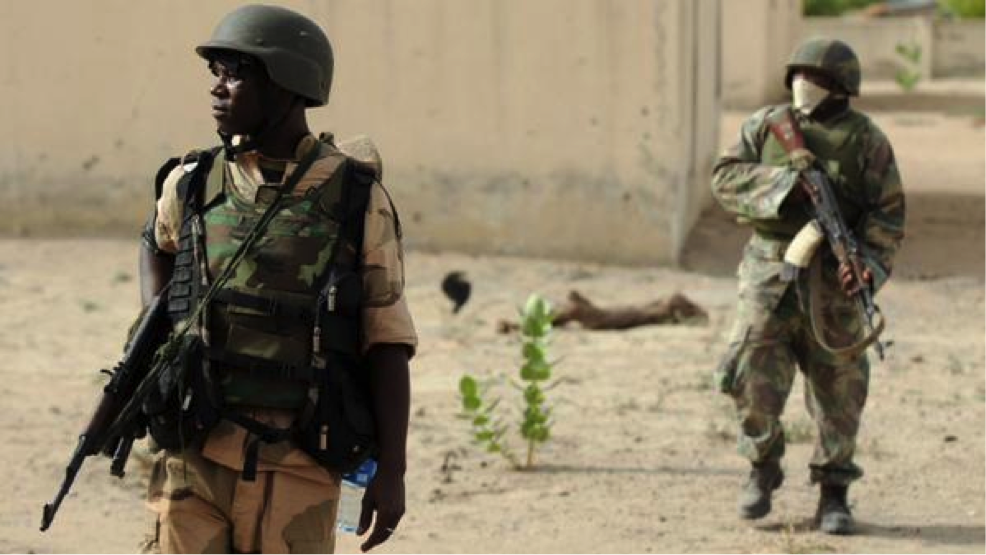Breaking News
Nigerian Soldiers Impregnate, Abandon Teenagers In Northeast Nigeria

Ummi Hassan sat on the trunk of a felled tree, her eyes fixed on her bulging belly. She was just weeks away from giving birth but tears rolled down her cheeks.
“I was in love with a soldier who got me pregnant,” she told AFP recently on the outskirts of the Borno state capital, Maiduguri, in northeast Nigeria.
“He was redeployed when I was two months pregnant,” she explained.
Ummi, 18, and her army lover kept in touch by telephone and she hoped to join him one day to bring up their baby in the economic capital Lagos, 1,200 kilometres (760 miles) away in the southwest.
But she said her dreams were crushed when he refused to provide money for her antenatal care.
“I don’t have food to eat, I only eat what I get from friends,” she added.
Ahmed Bolori, the coordinator of local charity the Fa’ash Foundation, said the teenager was one of “hordes” of young women seduced by soldiers sent to the northeast to fight Boko Haram.
“A lot of young women have been impregnated by military officers who take advantage of these women,” he said.
“Before the pregnancy is detected the military officer is posted to another place and he cannot be traced.”
– ‘Not reachable’ –
Kaltime Ari, also 18, said the father of her young son was also a soldier. He gave her money for an abortion but she refused to go through with it, she said.
“I was four months pregnant when he left and I don’t know where he is now. His phone is not reachable.”
Amina Mohammed’s soldier boyfriend was redeployed to northern Borno state when she was three months pregnant with her son, Umar. Now aged two, the toddler has never seen his father.
The three women talk of futile attempts to force their boyfriends to take responsibility, visits to the men’s superiors, being brushed off with excuses and having to survive on charity.
Boko Haram’s Islamist insurgency has killed 20,000 and made more than 2.6 million homeless in the northeast since 2009. But Bolori said the abandoned women were just as much victims.
“They are invariably poor, hungry and uneducated which make them ready prey for the soldiers. Impunity also emboldens the perpetrators who go unpunished,” he said.
In October last year, Human Rights Watch said camp leaders, civilian vigilantes, police officers and soldiers had raped and sexually exploited women and girls displaced by the conflict.
The organisation said it had documented 43 cases of abuse in July at seven camps in Maiduguri for displaced people. Women and girls were forced into sex and given false promises of marriage, food and money.
But they were abandoned if they became pregnant.
The government has promised a “discreet and unbiased investigation” into the claims, about which President Muhammadu Buhari said he was “worried and shocked”.
Supplies of food, clothing and medicine have been irregular to those who have fled the violence; many of the women are widowed and the girls orphaned, making them vulnerable to exploitation.
Kaltime said desperate times have led to desperate measures.
“There is hunger in Maiduguri, people don’t have food and have no money to buy anything to eat,” she added.
“This is why many young women like me end up sleeping with soldiers and getting pregnant because they are the ones with money to spend.”
– ‘Really unwanted’ –
Ummi and Kaltime said their parents kicked them out when they discovered the pregnancies. Ummi moved in with friends while Kaltime went to her godmother’s.
Amina still lives with her parents but says their attitude towards her has changed and she is no longer treated with love and affection.
Northern Nigeria is predominantly Muslim and conservative. Women who become pregnant outside marriage face rejection by their families for supposedly bringing them dishonour.
“In our culture unwanted pregnancies are really unwanted,” said Bolori, warning of the need to accept the children regardless of the manner of their birth.
“The danger is that the children born by these sex victims will grow to be more dangerous than Boko Haram if discrimination against them is not checked.”
There was no immediate response from the military when contacted by AFP.






